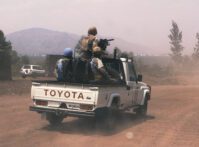-
Environmental Security Weekly Watch: July 28-August 1, 2025
August 1, 2025 By Madelyn MacMurray
A window into what we’re reading at the Stimson Center’s Environmental Security Program
Low Political Will and Depleted Supplies: Inside Iran’s Water Crisis (The New York Times)
Water shortages are a day-to-day reality for many Iranians, as reservoirs shrink, taps run dry for hours, and water pressure remains so low that it doesn’t reach above the second floor. This acute water crisis is driven by a confluence of climatic changes and poor water policies, as Iran’s five-year drought has combined with overdevelopment, excessive dam development, and draining groundwater for agriculture to push already dwindling supplies to the brink.
Climate change has slashed annual rainfall from eleven inches to less than six, while rapid groundwater depletion has devastated wetlands and caused parts of the country to sink by twelve inches per year. Officials warn that Tehran’s water supply could run out within weeks and urge drastic conservation measures that leave Iranians hoarding water, relying on polluted trucked-in supplies, and enduring power cuts amid extreme heat. The growing dry spell further adds to cumulative crises of war and inflation that have left many feeling Iran is in free-fall, with little faith in government solutions.
READ | Water, Corruption, and Security in Iran
Indonesia’s Controversial Environmental Deregulation Pushes Forward Despite Protests (Mongabay)
Indonesian civil society groups and NGOs are contesting the country’s 2020 Omnibus Creation Law, arguing it has enabled forced evictions, weakened environmental protections, and prioritized corporate interests over public welfare. Two separate judicial reviews, filed by nine NGOs with the Constitutional Court, have targeted key provisions of the law, including the reduction of public participation in environmental impact assessments, special privileges granted to Projects of Strategic National Importance (PSN), and a broad expansion of the definition of “public interest” to favor foreign and private industrial ventures.
Critics highlight projects like the Rempang Eco City, a PSN initiative which envisions the displacement of 7,500 Indigenous residents without their consent. The new lawsuits seek to restore public participation, reinstate environmental safeguards, and limit corporate exploitation of PSN privileges. Activists also argue that the law prioritizes foreign investment over Indigenous rights and ecological protection.
READ | Indonesia’s Just Energy Transition Must Not Just Be More of the Same
New Oil and Gas Licenses Imperil the DNC’s Protected Rainforests (The Guardian)
A report by Earth Insight provides evidence that new licensing initiatives for oil and gas blocks in the Democratic Republic of the Congo (DRC) include areas containing pristine forests, endangered gorilla habitats, and the world’s largest tropical peatlands. Approximately 64% of the area opened recently to 52 licenses for oil and gas blocks contracts include intact tropical rainforests. Experts also warn that drilling in these ecologically sensitive zones contradicts the DRC’s prior conservation pledges. For instance, the proposed oil blocks overlap with 72% of the Kivu-Kinshasa Green Corridor, which is protected by a previous agreement.
An estimated 39 million Congolese, including Indigenous groups like the Mbuti pygmies, depend on these forests and rivers for survival. A $500 million forest protection deal (2021-2031) was signed at COP26, but only $150 million of an anticipated sum of $400 million has been disbursed. Activists criticize the government’s lack of coherence in promoting conservation, while also auctioning off vital ecosystems.
READ | Avoiding the Resource Curse in East Africa’s Oil and Natural Gas Boom
Sources: Earth Insight, the Guardian, Mongabay, the New York Times
Topics: climate, climate change, conservation, development, environment, environmental justice, Eye On, land, meta, minerals, water security
 A Publication of the Stimson Center.
A Publication of the Stimson Center.







